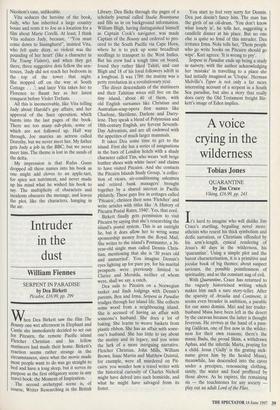Intruder in the dust
William Fiennes
SERPENT IN PARADISE by Dea Birkett Picador, £16.99, pp. 299 hen Dea Birkett saw the film The Bounty one wet afternoon in Elephant and Castle she immediately decided to set out for Pitcairn, the remote Pacific island Fletcher Christian and his fellow mutineers had made their home. Birkett's reaction seems rather strange in the circumstances, since what the movie made most people want to do was go straight to bed and have a long sleep, but it serves its Purpose as the first obligatory scene in any travel book: the Moment of Inspiration.
The second archetypal scene is, of course, Writer Researching in the British Library. Dea flicks through the pages of a scholarly journal called Studia Bountyana and fills us in on background information. William Bligh, having distinguished himself as Captain Cook's navigator, was made Captain of the Bounty and ordered to pro- ceed to the South Pacific via Cape Horn, where he is to pick up some breadfruit seedlings to transport to the West Indies. But his crew had a tough time on board, found they rather liked Tahiti, and cast Bligh and 18 of his loyal followers adrift in a longboat. It was 1789: the mutiny was 'a petty revolution in a revolutionary year. The direct descendants of the mutineers and their Tahitian wives still live on the tiny island, about 40 of them, with old English surnames like Christian and Australian-soap-opera first names like Charlene, Sherilene, Darlene and Darry- lene. They speak a blend of Polynesian and 18th-century English, are fervent Seventh- Day Adventists, and are all endowed with the appetites of much larger mammals. It takes Dea some time to get to the island. First she has a series of assignations in the bars of London hotels with a shady character called Tim, who wears 'soft beige leather shoes with white laces' and claims to have visited Pitcairn. And she contacts the Pitcairn Islands Study Group, 'a collec- tion of vicars, air-conditioning salesmen and retired bank managers' brought together by a shared interest in Pacific philately. These guys live in cottages called `Pitcairn', christen their sons 'Fletcher' and write articles with titles like 'A History of Pitcairn Postal Rates, 1940'. Yes, that cool.
Birkett finally gets permission to visit Pitcairn by saying that she's researching the island's postal system. This is an outright lie, but it does allow her to wring some sponsorship money from the Royal Mail. She writes to the island's Postmaster, a 36- year-old single man called Dennis Chris- tian, mentioning that she is '30 years old and unmarried'. You imagine Dennis's eyes lighting up for pure joy, for his marital prospects were previously limited to Clarice and Meralda, neither of whom were, shall we say, a catch. Dea sails to Pitcairn on a Norwegian tanker and finds lodgings with Dennis's parents, Ben and Irma. Serpent in Paradise trudges through her island life. She collects some wood from a neighbouring island. She is accused of having an affair with someone's husband. She does a lot of baking. She learns to weave baskets from plastic ribbon. She has an affair with some- one's husband. She has little to say about the mutiny and its legacy, and you sense the lurk of a more intriguing narrative. Fletcher Christian, John Mills, William Brown, Isaac Martin and Matthew Quintal, for example, were all murdered on Pit- cairn: you wonder how a travel writer with the historical curiosity of Charles Nicholl might have delved into such homicide, and what he might have salvaged from its fester. You start to feel very sorry for Dennis. Dea just doesn't fancy him. The man has the girth of an oil-drum. 'You don't know what lonely is', he tells her, suggesting a candlelit dinner at his place. But no one else is quite so fond of this intruder. Dea irritates Irma. Nola tells her, 'Them people who go write books on Pitcairn should go wipe'. Karl agrees: 'It is wrong to pry'.
Serpent in Paradise ends up being a study in naivety, with the author 'acknowledging her 'mistake' in travelling to a place she had initially imagined as 'Utopia'. Herman Melville's Typee is not only a far more interesting account of a serpent in a South Sea paradise, but also a story that really does carry the Old Testament freight Bir- kett's image of Eden implies.










































































 Previous page
Previous page